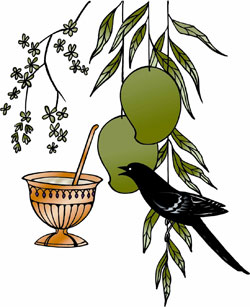Yugadi (Kannada: ಯುಗಾದಿ, Telugu: ఉగాది) from yuga and aadi, yuga means era, aadi means start. It is the New Year’s Day for the people of the Deccan region. While the people of Karnataka and Andhra Pradesh use the term Yugadi or Ugadi for this festival, in Maharashtra it is Gudi Padwa, for Sindhis it is Cheti Chand, in Manipur – Sajibu Cheiraoba, Baisakhi in Punjab and Puthandu in Tamil Nadu.
It falls on a different day every year because of the lunisolar calendar. The Saka calendar begins with Chaitra (March–April) and Ugadi marks the first day of the new year. Chaitra is the first month in the Indian almanac. It is believed on this day Brahma – the Creator formed the universe.
It also heralds spring and new life. Homes are cleaned and decorated, new clothes are bought, fresh mango leaves are strung up above doorways to denote prosperity.
The day with ritual showers, prayers, and then the eating a dish with mixture of six tastes, called Ugadi Pachhadi or Bevu-Bella. The six tastes symbolizes emotions – sadness, happiness, anger, fear, disgust, surprise represented by:
- Neem Buds – bitterness
- Raw Mango – tang
- Tamarind – sourness
- Green Chilli/Pepper – heat
- Jaggery and ripe banana – sweetness
- Pinch of Salt – saltiness
Ugadi is time for rangoli and some good heavy lunch! Thus a festival of many shades. It ushers in the New Year, brings a rich bounce of flora and fills the hearts of people with joy and contentment.


No comments:
Post a Comment